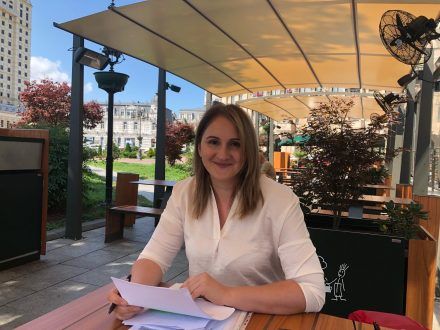Expectations of Female Prisoners
17th June 2020

The Human Rights Center has extensive experience in legal relations with detainees. Lawyers of the organization have been defending the rights of prisoners in various agencies for years. For over 11 years working for this organization myself, I am trying to help them and contribute to improving the legal status of prisoners. I have gained a lot of experience in dealing with them over the years.
I always note that the special penitentiary facility for women is another small world in the penitentiary system. I have gained a lot of vital and professional experience while communicating with female prisoners. It is both interesting and challenging for me to work with them.
Repeatedly the women’s prison has become a place of protest for prisoners. Women in detention, by various forms of protest, are trying to draw attention to a specific issue. Protests in prisons can be mainly caused considering the conviction of a prisoner, requests to improve the legal conditions in a prison facility, or by considering the mechanisms for release from prison. The scale of the protest also depends largely on the problematic issue, as mainly the prisoner concerned by the problem is protesting, with some exceptions.
There are frequent cases when female prisoners resort to extreme measures of protest – hunger strike – to solve a specific problem. In general, one prisoner or a certain group of prisoners starts the hunger strike, but if the problematic issue concerns the general mechanism of release from prison, unanimity grows, and the protest becomes more widespread.
During my time at the Human Rights Center, I have been receiving many letters from women’s prison saying “Your client has started a hunger strike.” Over the years I regularly have been receiving the phone calls from female prisoners informing me they were on a hunger strike despite their complicated health conditions. It is hard to receive these phone calls. On the one hand, it is unpalatable that a person had to resort to such an extreme form of protest, especially if she has health conditions. On the other hand, in this way, the prisoner struggles for a specific goal, for her rights. Here, it’s hard to take responsibility and advise this person to make a specific decision on whether to end the hunger strike. Although I very much want this person to achieve her goal and protect her rights, I am never in favor of hunger. Especially if it happens at the expense of their health.
Earlier this year, several female detainees resorted to an extreme measure of protest, the hunger strike, demanding the changes in the inmate’s recent pardoning rule adopted by the president in 2019. In the joint letter sent to the president, the women prisoners were demanding a change in the pardoning rule and its dehumanization. In response to the letter, soon all women prisoners were asked to complete the pardon application to the President Administration, bringing the positive expectations to the prison, resulting in a halt to the hunger strike.
Many countries around the world have faced challenges caused by a novel coronavirus. Coronavirus confirmed as a pandemic by the World Health Organization. Georgia has also been actively involved in the fight against the epidemic. The state declared a state of emergency on March 21, imposing certain restrictions. Several restrictions also applied to prisoners. This period was especially challenging for women prisoners. Their psychological state is farther complicated by being anxious for their families during the spread of the virus and, for the same reason, temporary restrictions of their rights and on visits to prisons. In this troublesome situation, the expectations of female prisoners for the pardon of the President have intensified and gained much greater importance.
The positive expectations of female prisoners ended with President pardoning only 9 convicted women on April 7 regarding the celebration of the Annunciation. A new wave of protests followed the president’s decision. Women prisoners went to a hunger strike again and noted that they had been deceived again, and the practice of unequal treatment by the President’s administration was still ongoing. This time the health complications of the prisoners’ on hunger strike followed this extreme measure of protest, which led to the temporary cessation of the hunger strike, but their demands on the President remain consistent.
The United Nations High Commissioner for Human Rights has advised states to step up their efforts to address the care of prisoners and consider the mechanisms of their release. In the process of fighting the epidemic, many countries have released prisoners en masse, but this process has not affected Georgia.
In Georgia, as in other countries besides the pardon, there are other mechanisms of release which effective use will allow many prisoners to return to their families. After the disappointment with the president’s decision, female inmates expect that the mechanisms that will bring them back to their homes will be used actively and for humane purposes.
I, too, since being compassionate towards female prisoners, have positive expectations and look forward to them to notify me in a phone call about their release from prison and coming back to their families. Through such phone calls, our small but very interesting story on the relationship between a prisoner and his human rights defender ends.